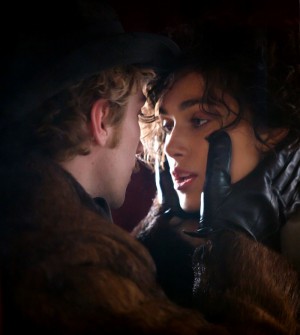‘Anna Karenina’ Is Full Of Beauty, But Yearns For Something More
The challenge of bringing one of the all-time great romances to the screen once again is finding some way to make it a completely unique entity unto itself. With a few dashes of old world sensibilities and a whisper of modern film techniques, you’ll fall in love with Anna Karenina all over again, though results may vary.
Living a comfortable life as the wife of respected government official Alexei Karenin (Jude Law), Anna Karenina (Keira Knightley) wants for nothing among the upper crust of 19th century Russia. As part of her privileged life, she is expected to conform to the unspoken morality code of the day, and a trip to Moscow to convince her sister-in-law (Kelly Macdonald) to reconcile with her unfaithful husband (Matthew Macfadyen) means Anna is already going against her own husband’s wishes. When she encounters the wealthy soldier Count Vronsky (Aaron Taylor-Johnson), a surge of passion between the two of them for the briefest moment is all but impossible to ignore. Even as she returns to St. Petersburg, she is unable to stop thinking about the dashing young man, who has begun to shadow her at every turn. Despite her better judgment, Anna begins an affair, setting off a chain reaction of immediate repercussions with her cuckolded spouse, her status-dependent lover, and the social circle eager to jump on the resultant scandal.
Whether she’s playing Elizabeth Swann, Elizabeth Bennett or the Duchess of Devonshire, any time Knightley stars in a period movie, she wears her role well, and no, I’m not just talking about her clothing. Just as she wraps herself in the elegant attire of a Russian aristocrat of the time playing one of literature’s most famed adulteresses, the ever-engaging actress simultaneously swathes herself in a more contemporary wardrobe — the woman who follows her heart and wears her emotions on her sleeve. Though this interpretation of Anna — who’s been played by no less than Greta Garbo and Vivien Leigh — is less than subtle, it’s certainly layered as she goes from being content as a wife and mother to overwhelmed with the possibilities of a life she never knew existed to pure despair in realizing no decision she makes will let her be completely happy. Bearded and bespectacled Law has a supreme gravity as her solemn husband, prone to lectures on morality and duty to country and creator. What woman wouldn’t be swayed by the more fresh-faced and adoring Vronsky? With his wavy locks and devil may care attitude, Taylor-Johnson seems to be channeling Errol Flynn as the privileged cavalry officer who draws the heroine into temptation only to find that being together isn’t all it’s cracked up to be when he’s still under the thumb of his judgmental mother (Olivia Williams). Macdonald does fine as Anna’s only confidante, the soft-spoken Dolly, while Macfadyen, the Mr. Darcy of Knightley’s Pride & Prejudice, plays her brother this time, the smooth-talking Stiva, whose best friend Levin (Domhnall Gleeson) is hopelessly devoted to Kitty (Alicia Vikander), who in turn has an unrequited fondness for the otherwise engaged Vronsky.
Levin’s misery and experiences in the countryside, a vital side-story in Leo Tolstoy’s novel, is diminished considerably in Tom Stoppard’s screenplay, which puts the most emphasis on Anna and Vronsky, as well as an unusual amount of attention on Vronsky’s sly cousin Betsy (Ruth Wilson). The structure may be condensed, but we still get the gist of everything happening amid these people and their comings and goings. What becomes an inhibitive factor is director Joe Wright’s insistence on staging the story as if it were completely within the constraints of a theater. Whole action sequences take place in front of backdrops and the scene changes are lit up for all to see and others seem to be set in some kind of backstage limbo. If Wright, known for showing us grand, sweeping landscapes in Pride & Prejudice and Atonement, stuck to this aesthetic choice throughout, it might be easy to consider it brilliant. What’s bizarre is how he picks and chooses which scenes are framed in this style and which are shown as naturalistic, such as those set on Levin’s farm. How do you create a scene at a racetrack with actual horses and make it look like a carnival midway game? At least Wright keeps the trains running on time…
The masterful acting, gorgeous costuming and extravagant set designs of Anna Karenina pull us in easily, but Wright’s stylistic choices push us away just as quickly. Yet, even with this polarizing approach, the movie as a whole is still mesmerizing, although it’s hardly the definitive version. It feels appropriate to paraphrase Tolstoy’s famous first line in saying great book-to-screen adaptations are all alike. Every not-so-great adaptation is not-so-great in its own way.
Rating: 2.5 out of 4 stars


